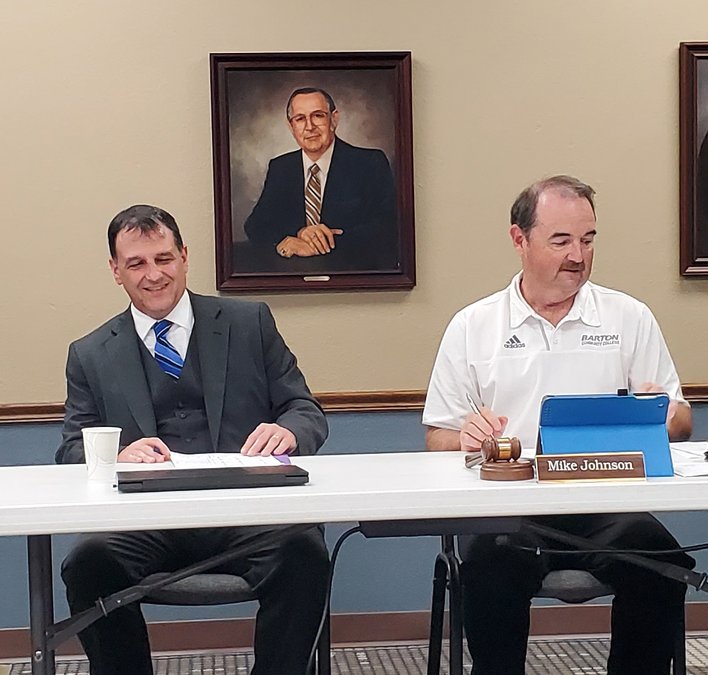The Barton Community College trustees were given two options for next year’s operational budget – with an additional 5% or 2.5% for salaries. Either way, Vice President of Administration Mark Dean said the college will request the same amount of local tax dollars it received last year and the mill levy will go down.
Dean’s recommendations were presented at a board of trustees study session on Tuesday and official action is expected at the July 23 meeting. Tuesday was the first official board meeting with the new president, Dr. Marcus Garstecki.
“We have two budgets,” Dean said. “The Operational Budget is what we run on all year long.” The Published Budget consists of numerous forms provided to the State, and a form that is published as a legal announcement in the Great Bend Tribune. The published budget will show that last year’s mill levy was 29.691. The Revenue Neutral Rate (RNR) is the mill levy that would bring in the same amount as last year. Due to changes in valuations, the RNR is estimated at 28.634 mills and that is the mill levy the college will request.
The county’s assessed valuation grew from $321,745,658 to $334,375,603, which is why a lower mill levy is needed to collect $9,574,623 ($15,413 less than last year).
Here are the summaries of the budget options as presented:
Option A
• Increases revenue by $823,777 and increases expenditures by $105,428 over last year’s operational budget
• Provides a 5% increase to the salary budget to keep up with the market value salary level per Performance Solutions. Increases the starting salary levels by the same 5%.
• Includes a reduction of approximately 11 full-time positions (possibly 12) for FY25.
• Includes increases in cost for health insurance, Social Security taxes, and other benefits.
• Includes reductions in operational budgets.
• Includes a planned deficit of $394,823 at the end of FY25.
Option B
• Increases revenue by $823,777 and decreases expenditures by $304,757 over last year’s operational budget.
• Provides a 2.5% increase to the salary budget. This amount does not maintain the market value salary level per Performance Solutions. The starting salary levels would not change, so new employees would start 5% below market value. This would put the college at a hiring disadvantage and it would again need to look at “catching up” to maintain its workforce and provide services.
• Includes a reduction of approximately 11 full-time positions (possibly 12) for FY25.
• Includes increases in cost for health insurance, Social Security taxes, and other benefits.
• Includes reductions in operational budgets.
• Includes a planned increase in reserves of $15,362 at the end of FY25.
The actual ending balance with either option will depend on enrollment growth and responsible spending throughout the year. Last year, the operational budget called for a $1.1 million end-of-year deficit but the college ended FY24 with a $227,865 deficit that was taken from Barton’s cash reserves.
“We’re going to be playing catch-up with unfilled positions,” Dean said. For other reductions in the budget, he asked each department to look for areas to cut and saved about $650,000 campus-wide. This includes cuts to some student employment and professional development.
Trustee Don Learned said he favors larger pay increases. “I would like to see us give more.”
Dean said more than 5% overall would put the college above market value level. It took several years to get Barton’s pay rates at market level and until that happened there were 62 positions they could not fill.
Trustee Dale Maneth asked if the board was micro-managing salaries. “What if the board approved a salary figure and left it to the president?”
Dean said the Option A budget does not mean every individual automatically receives a 5% raise, although it does increase starting wages by 5%.
Athletic insurance
The trustees also reviewed the athletic insurance quotes for next year. The total cost will be $102,561, up from $62,000 last year.
The cost was stable for several years, Dean said. “Not so this year.” This is due to inflation and the fact that it is based the three-year average for claims. The claims were down during COVID but have been high for the last two years.





